Here’s a summary of some of the outcomes of our fourth Apollo Protocol Hack and information about what comes next.
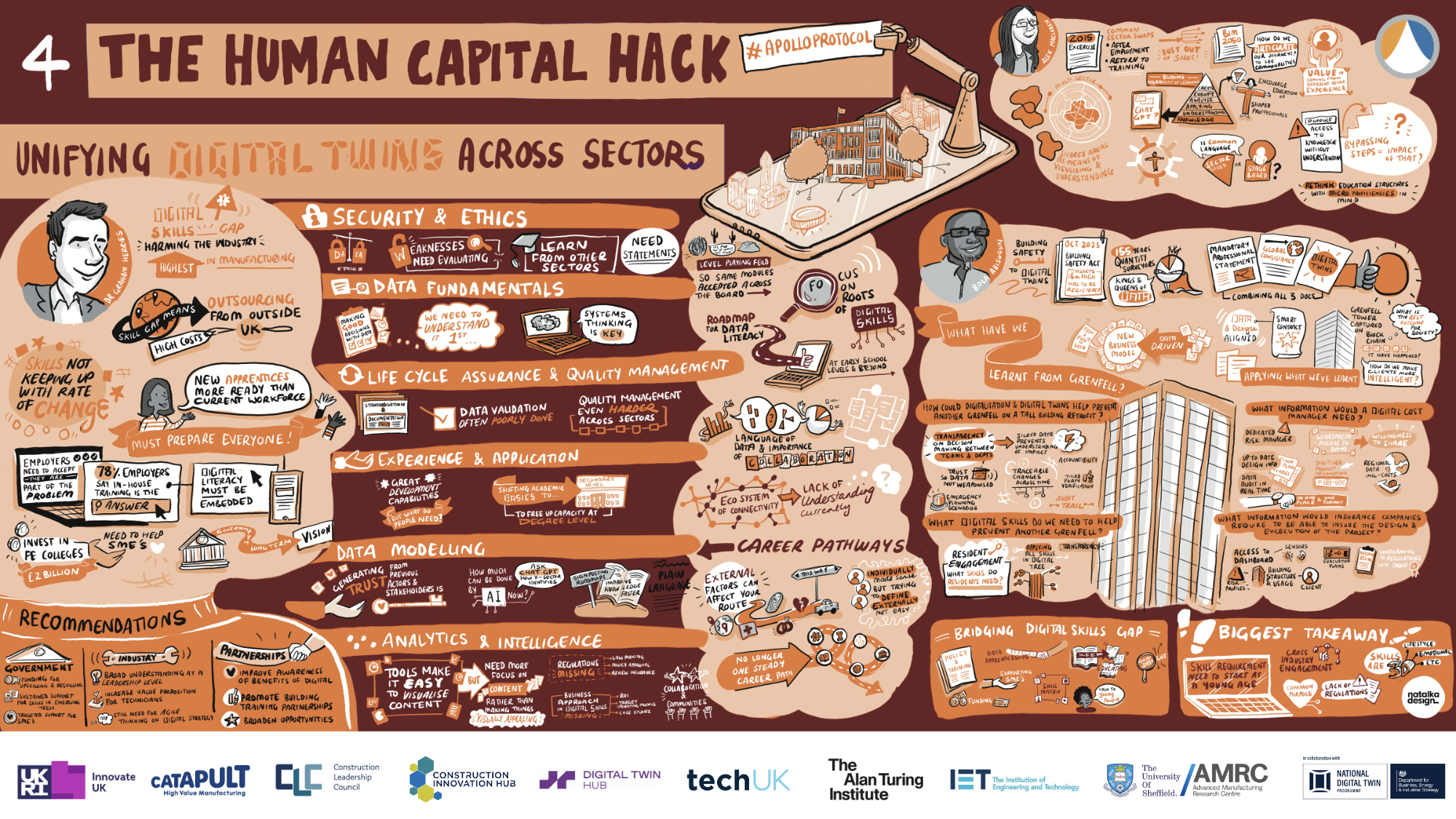
We’re at the end of our 4-month, 8-event marathon and, to be honest, a bit tired! The team has been overwhelmed by the volume of interest from across the built environment, manufacturing and tech sectors in our Apollo Forum hacks. It's time to take stock, review the huge amount of learning and start the next stage of our journey. But first, let’s look back on the Human Capital Hack and what we learned.
Why have we been hosting Hack Events?
Over the last four months the Apollo Protocol have hosted eight in person and online Hack events exploring four different themes relating to cross sectoral digital twins and information management. These Hacks formally launched the Apollo Forum concept for the built environment and manufacturing supported by the technology sector; a new community mechanism designed to explore our different uses of information and begin to evolve a unified, common language for data between our sectors. This common language framework is known as the Apollo Protocol.
By bringing together professionals with a keen interest in each of four themes, practitioners working on active issues and tech specialists who understand the value of data, we benefit from a deep and revelatory understanding of what is actually happening and can begin to explore how we might overcome the barriers to change.
The last of these four themes is Human Capital, exploring issues such as digital skills and professional career development with a view to enabling the collaboration so essential to cross sector information management.
Why are we talking about Human Capital and Digital Skills?
The Apollo Protocol white paper summarised the Human Capital theme like this:
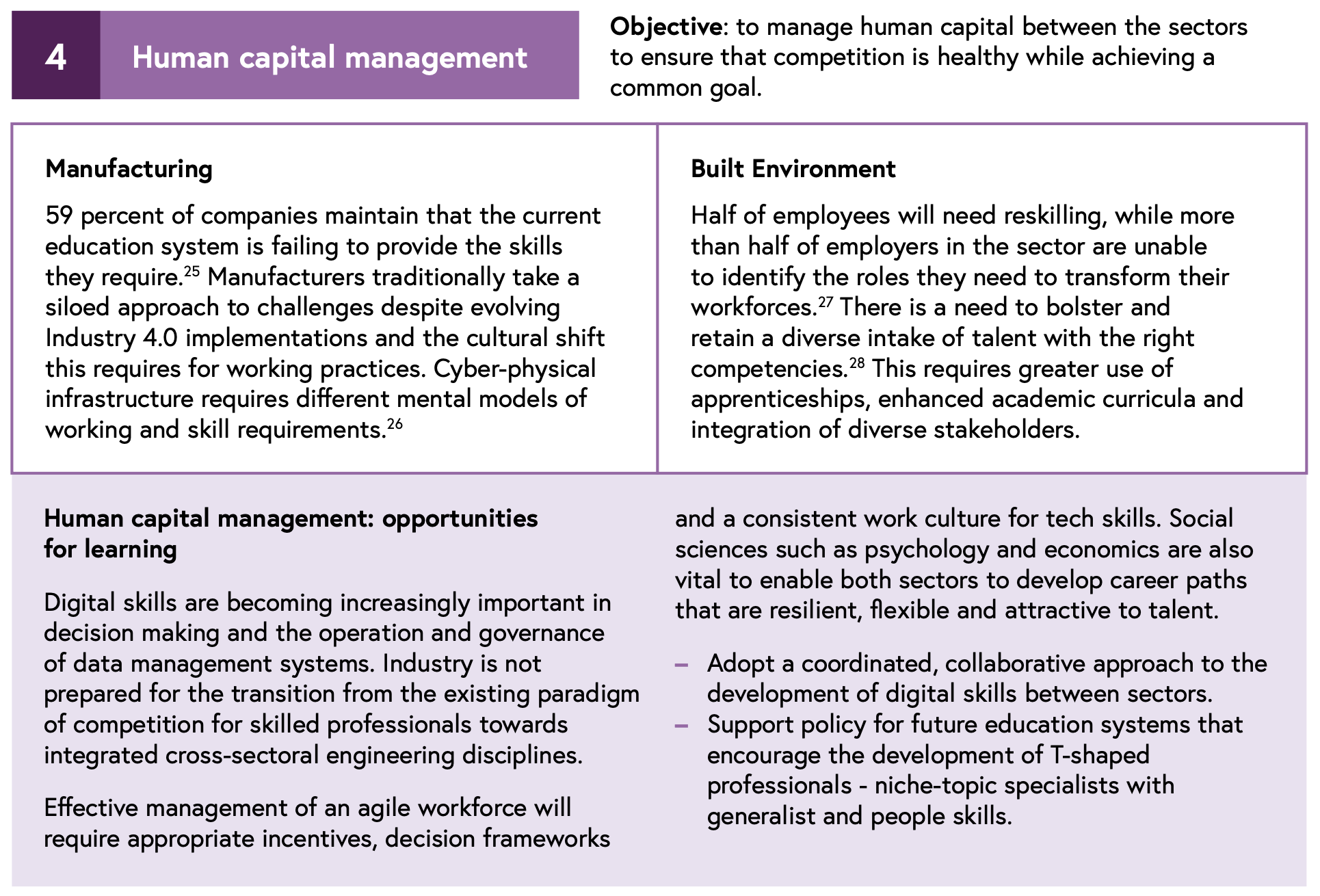
Extract from ‘The Apollo Protocol: unifying digital twins across sectors’ White Paper
For this fourth hack, which took place in person on 9th February in London and also online on 16th February, we identified three initial activities – evaluating our organisations digital skills needs, mapping our careers to understand the challenge to professional training, and a practical analysis of a real life scenario – the retrofit of a tall building in the context of the new Building Safety Act.
Visualising our careers highlighted just how different we all are, and yet exploring the retrofit scenario and the challenge of the Building Safety Act produced deep agreement. We need a fresh look at career development and training to enable cross sector data sharing and agile professionals. Our institutions know that their traditional siloed methodologies are not responding well to the needs of an agile workforce, and many are already reviewing their definitions of what a ‘chartered professional’ is[1].
Understanding Digital Skills
Our first activity was led by Dr Graham Herries, chair of the IET’s Innovation and Skills Panel. The IET’s latest survey focused on digital skills, and Graham presented some of the findings and recommendations.
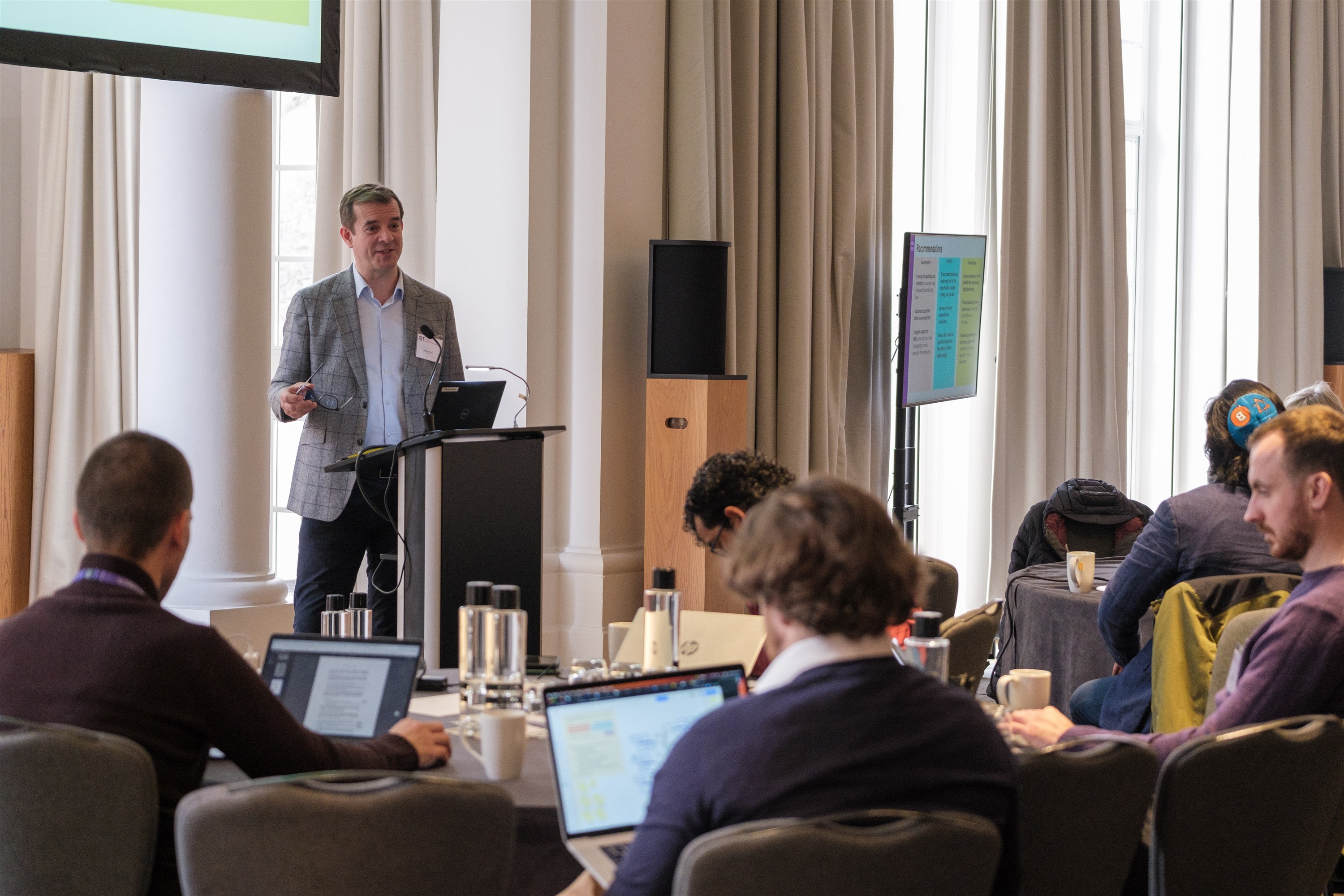
Dr Graham Herries sharing the IET Skills for a Digital Future survey
Industry is reporting a growing digital skills gap in their workforce which is harming productivity and innovation and restricting their growth. The gap is expected to increase in the coming years because skills are not keeping pace with the increasing rate of change across sectors.
The need for digital skills is not just confined to IT and technical professionals – digital literacy is essential for all employees and should be implicit in the future. This means that upskilling and reskilling are as important as apprenticeships. The IET recommends that the government focuses on upskilling and reskilling, in particular supporting SMEs to identify needs and train their employees. The IET has urged the government to retarget the £2bn in unspent funds from the apprenticeship levy towards upskilling and reskilling in digital skills, through multiple short term interventions (known as micro-credentialing).
In the Apollo Protocol tradition of building on existing tools, Graham’s activity made use of the National Digital Twin Framework’s Skills and Competency Framework which broke down business and digital skills into six different areas:
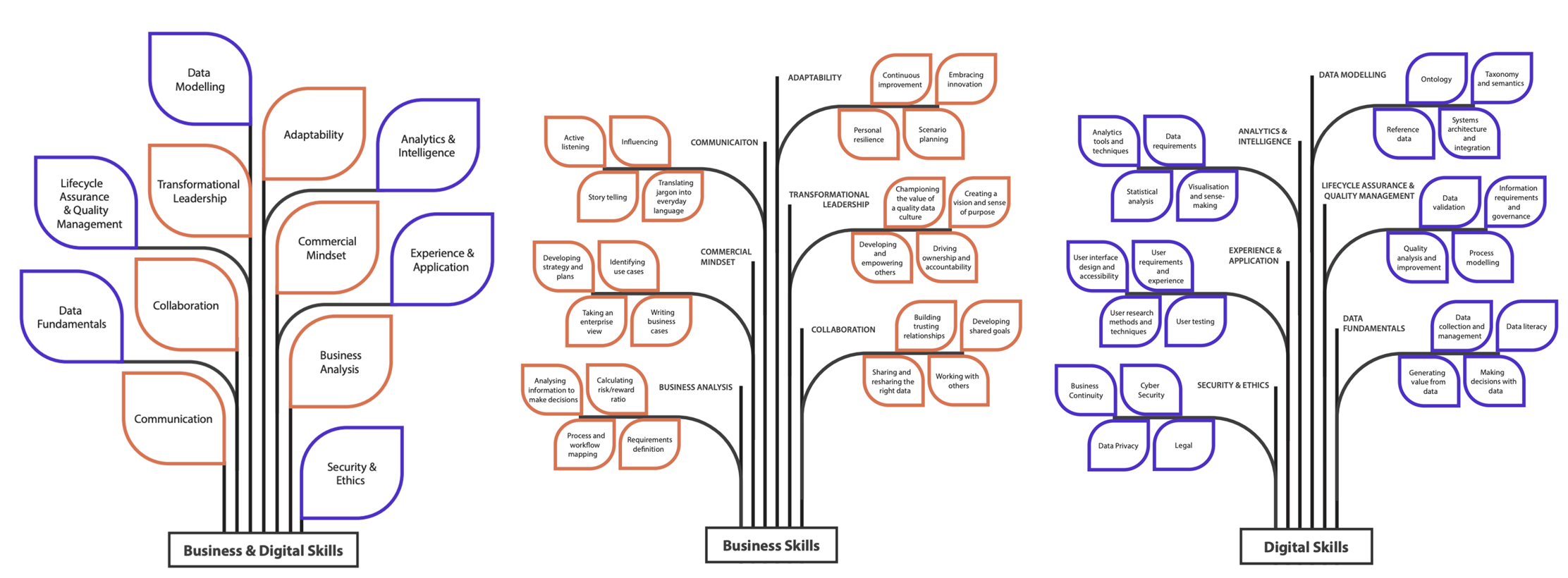
Extract from ‘Skills and Competency Framework: Supporting the development and adoption of the Information Management Framework (IMF) and the National Digital Twin’ National Digital Twin Programme, March 2021
Each group was asked to identify whether they felt we were strong and weak in each of the digital skills areas, prompting a wide ranging discussion about the breadth of need and understanding.
Of all the skills areas, Security and Ethics seemed to cause the most concern, but the fundamentals are lacking too, in particular the ability to generate value from data. This explains why businesses are yet to capitalise on the enormous value data can bring. On the plus side, analytics and intelligence skills were generally seen to be good, though there is a concern that analytics tools need to focus on the right questions and provide context, to ensure trust in data. In other areas there was a mixed response.
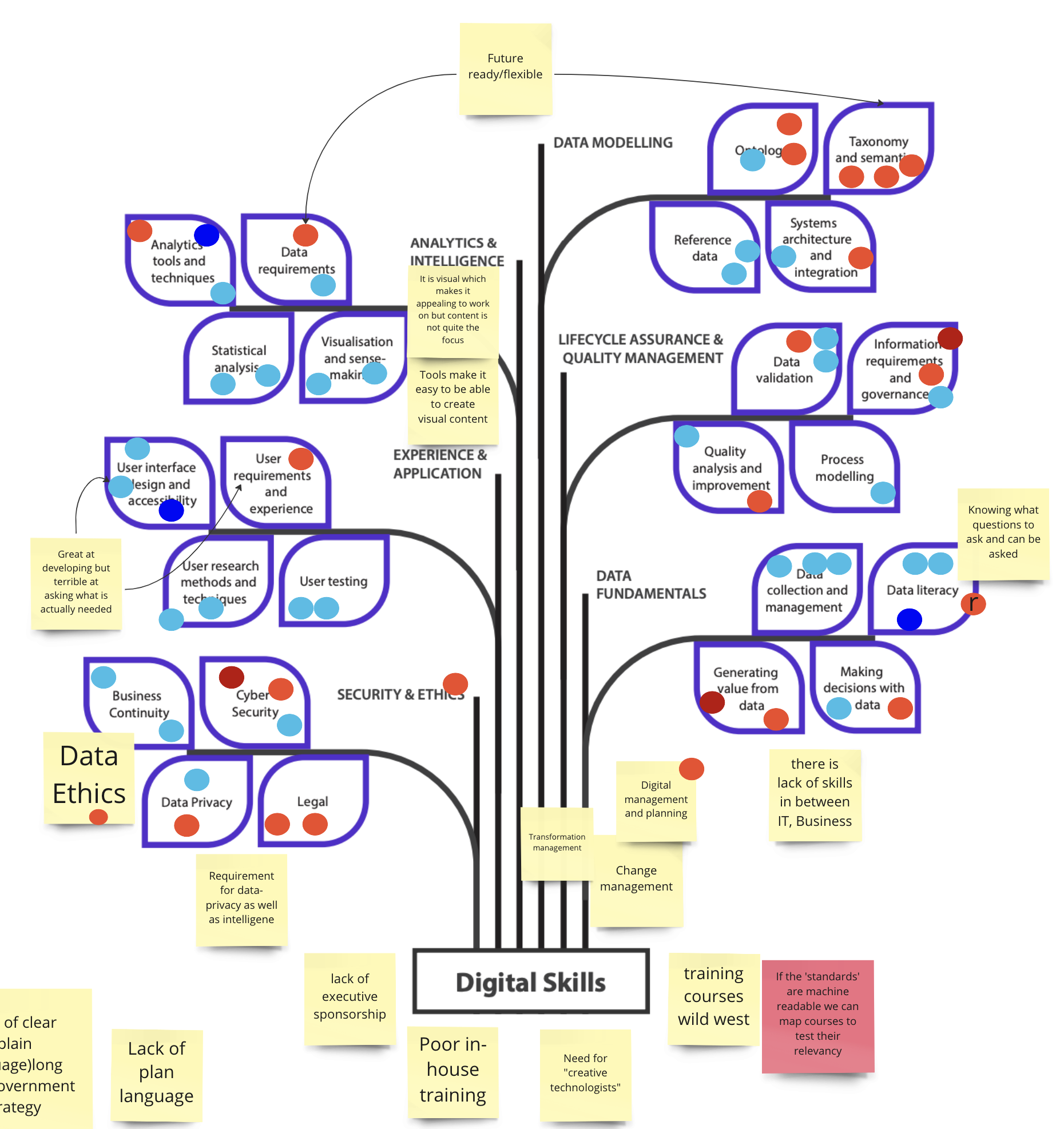
Example of a marked up digital skills tree from one of our groups
It was also felt that some skills were missing from the analysis tree, in particular skills in linking physical and digital platforms (unsurprising in a room of digital twin enthusiasts). Many parallels were drawn to related business skills, from critical thinking, change management and systems thinking to the need to apply a commercial mindset to digital. For me the exercise illustrated how digital skills and literacy really do need to be implicit throughout a business operation which needs to value them properly and be supported to upskill the workforce.
We are Portfolio Professionals
Having taken a broad look at the research, Alex MacLaren brought us back to personal experience for our next activity.
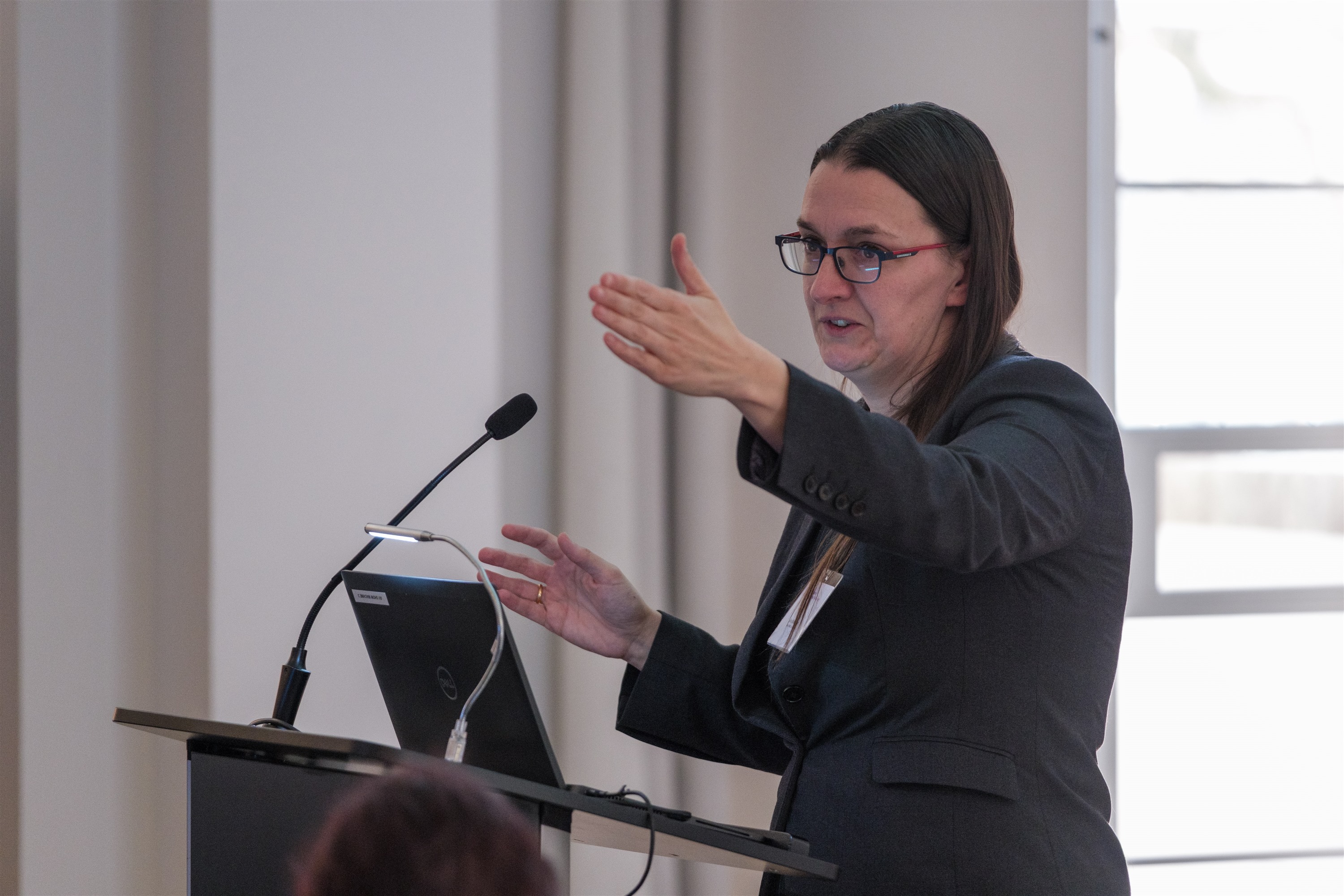
Alex is Associate Professor in Architecture at Heriot Watt University and eight years ago was involved in the Construction Industry Council’s BIM2050 group of young industry professionals. Recognising that the group members had quite a complex set of career pathways, they developed an exercise to externalise these journeys. Working with Alex we developed an adapted version of this exercise for our delegates at the Human Capital Hack.
Each group mapped their careers against a timeline according to which part of a project programme they were working to at any one time.
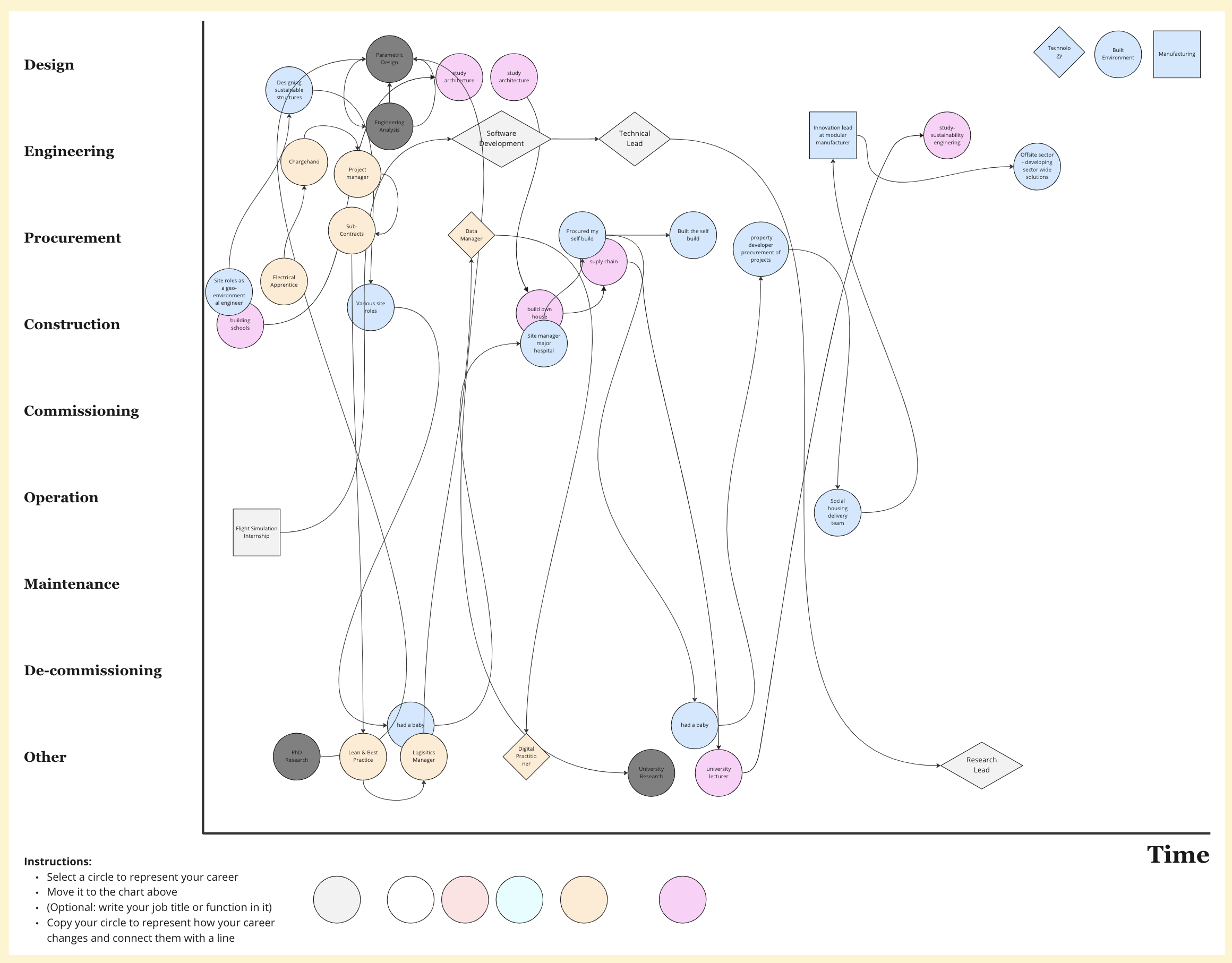
Some of the Hack participants map their career paths
Following the exercise we explored, with Alex’s help, what this means for the professional and their institutions. We are all cross-disciplinary skilled workers – no one's career follows a direct path from qualification into specialism. That being the case, traditional institutional support no longer provides what these professionals need, yet they are hugely valuable as ambassadors between sectors and disciplines. Cross disciplinary skilled workers are the interpreters that will create our unified common language.
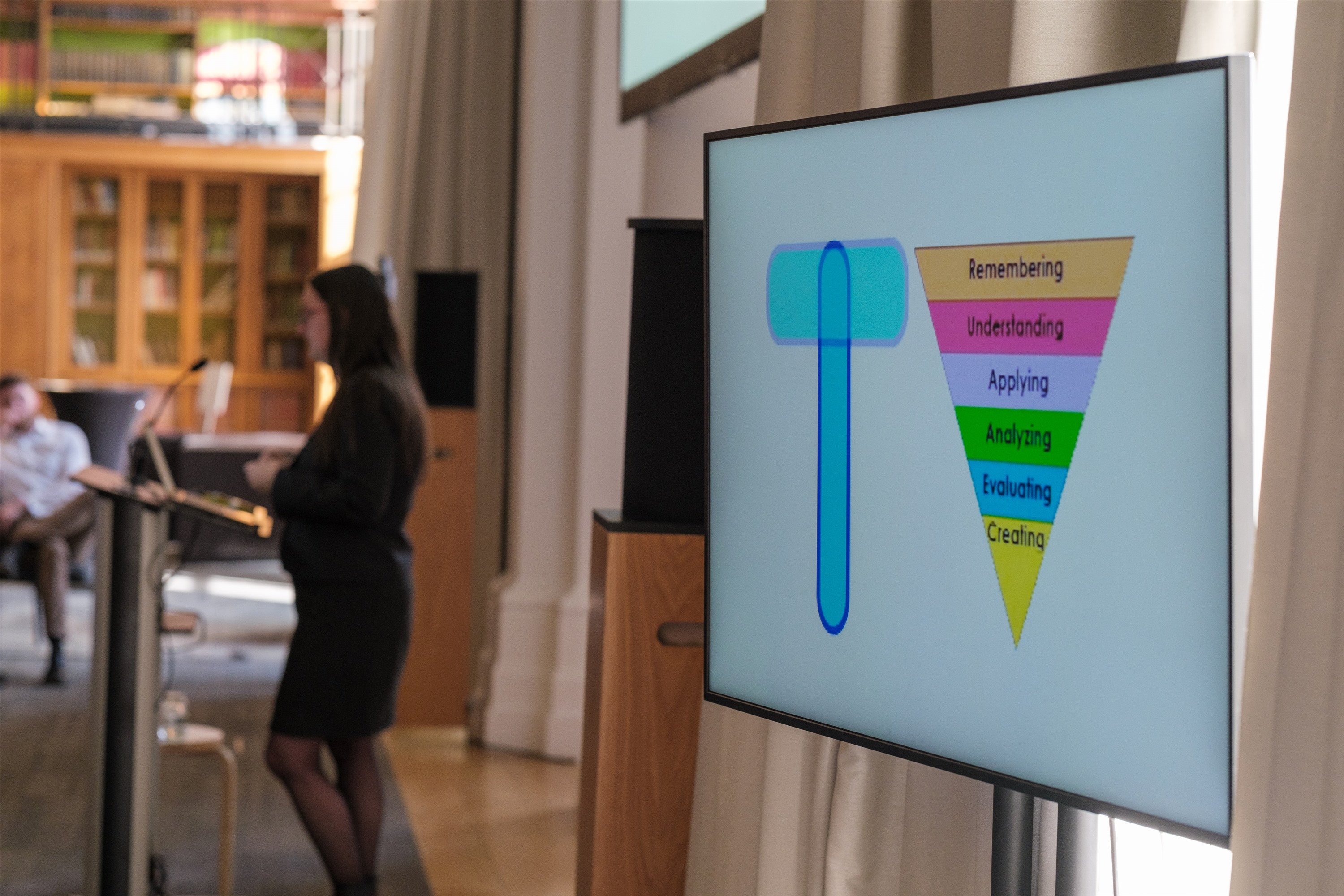
A T-shaped professional is one with a broad level of understanding in several areas and deep ability to analyse in one area
One thing I learned from this exercise was how limited, though useful, the term ‘T-shaped professional’ was. A T-shaped professional is one with a broad level of understanding in several areas and deep ability to analyse in one area. But Alex’s work shows us that we are more amoeboid in our shape, with overlapping areas of commonality with our colleagues in skills and experience.
The Challenge is Cultural
Our final activity brought us down to earth with a bump. Bola Abisogun OBE, chartered quantity surveyor and disruptor, introduced us to the challenge of cost prediction for the 21st century surveyor, and then asked us to consider a number of questions relating to the fictional scenario of a tall residential building retrofit. A scenario similar (though with particular severity) to those traceability challenges we all deal with on a day to day basis with manufactured goods, for example, but often do not discuss.
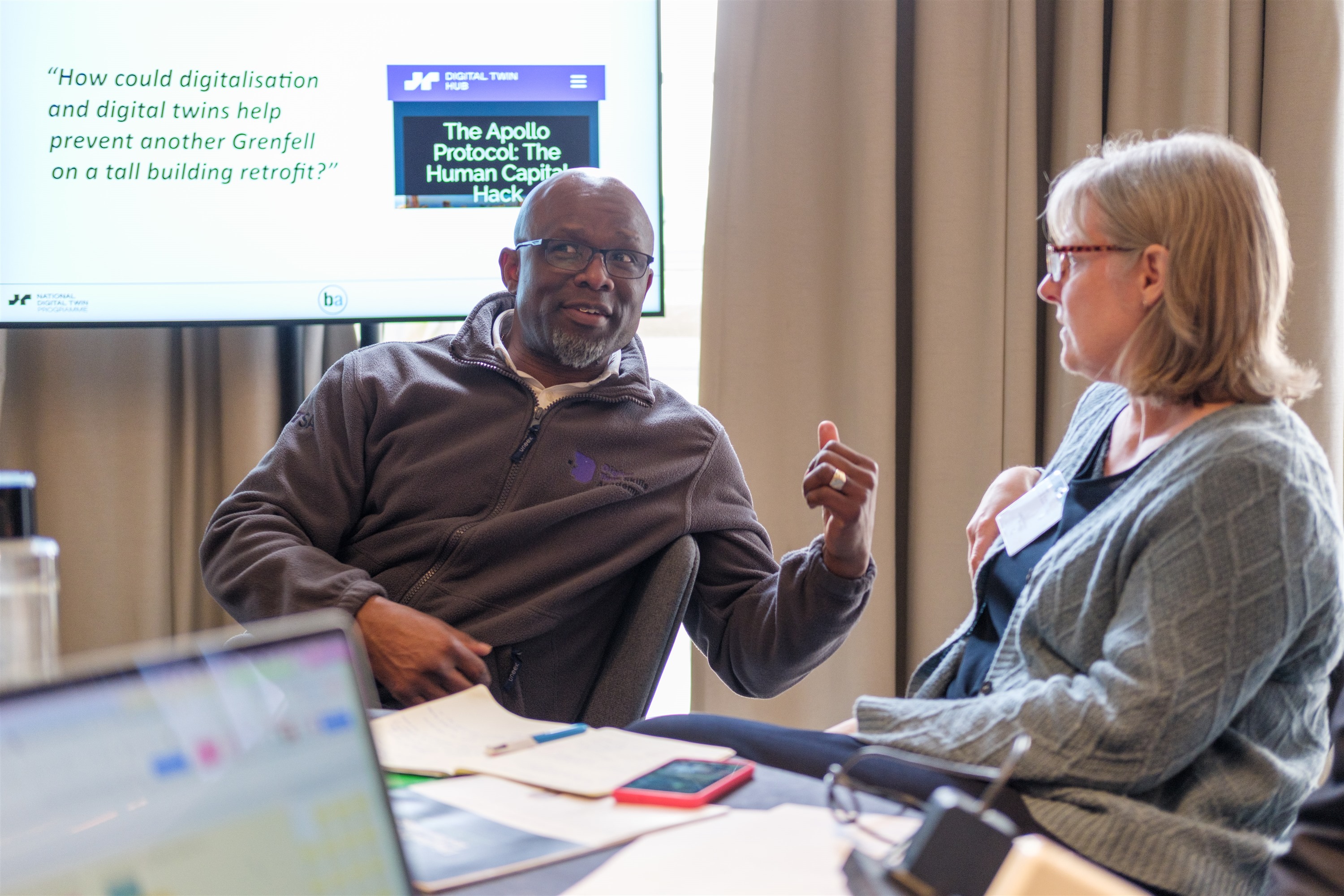
Tall building retrofit is a taboo subject in the construction industry following the Grenfell Tragedy of 2017, but it cannot be avoided. The Building Safety Act received Royal Assent in April 2022 and each building owner will need their safety regime in place in October this year.
The questions Bola asked us were:
- How could digitalisation and digital twins help prevent another Grenfell on a tall building retrofit?
- What information would a Digital Cost Manager need?
- What digital skills do we need to help prevent another Grenfell? And
- What information would insurance companies require to be able to insure the design and execution of the project?
Whilst these questions were specific to this challenge, they provided a focus for a cross-sector discussion of related issues in our sectors.
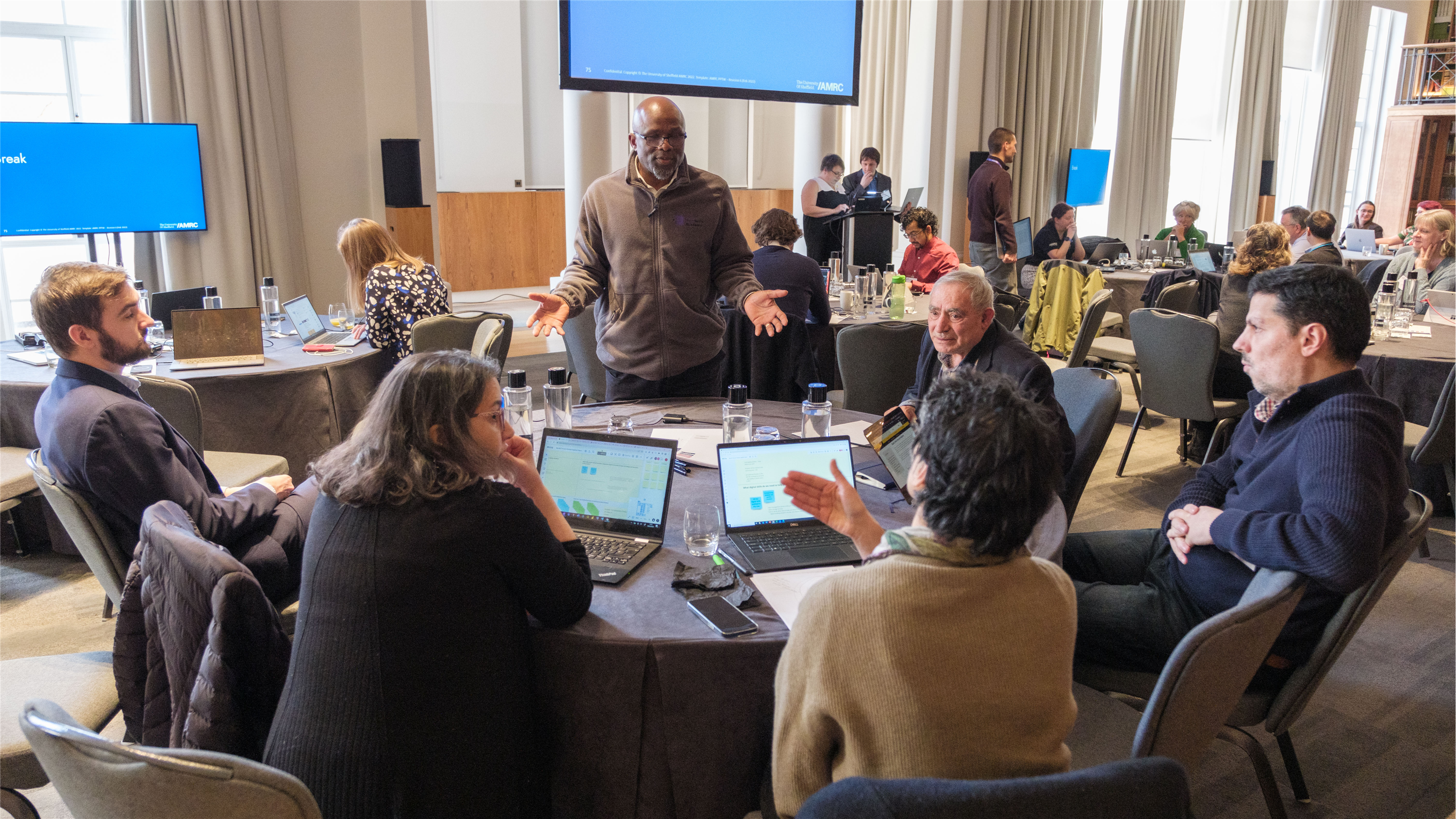
The new Building Safety Act will impact not only building owners but all who provide information to the supply chain – product manufacturers, designers, contractors and subcontractors, cost consultants. All actors in the supply chain don’t only need to be suitably qualified and experienced, they also need access to trusted and structured data in order to apply their skills appropriately in an increasingly complex environment.
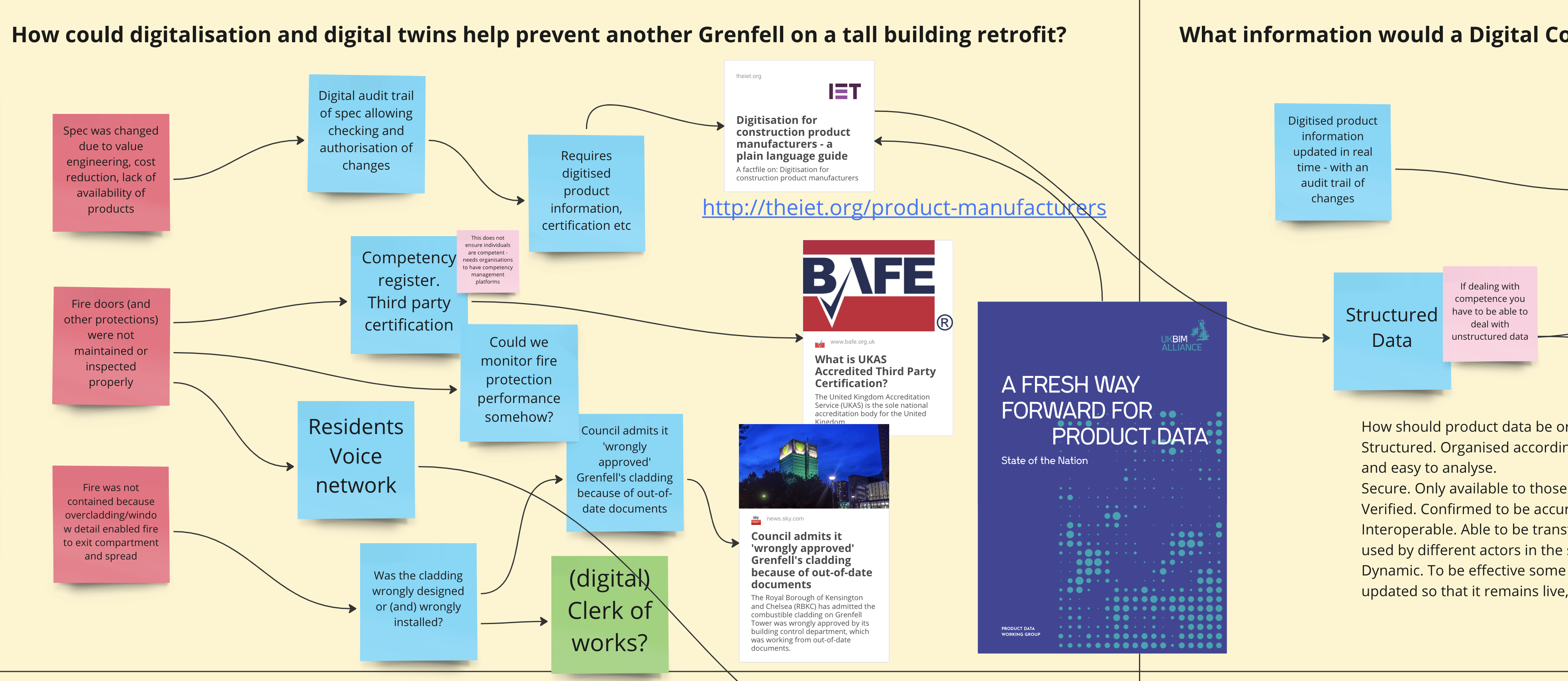
One exploration of the question about preventing another Grenfell tragedy
One approach to answering these questions is to see digitisation as a solution that simply needs to be implemented and the problem will go away. But that would be naïve. Competence is a function of human behaviour as well as ability. Behaviour is influenced by the many constraints on individuals and organisations placed by their employers, clients, suppliers – something we identified when discussing Paul Surin’s eco home challenge in the Circularity Hack. The reason why the insulation installer left a full roll of insulation uninstalled in his loft was not because he was ‘stupid’ or ‘didn’t care’. Something else is affecting behaviour.
Whilst a digital audit trail is so valuable for real time risk assessment or value modelling, in order to implement one we need to combine regulation and enforcement with an understanding of the human and commercial pressures which seek to prevent one. As Bola said in answer to the question ‘who will pay for it?’ – 72 people have already paid with their lives.
Reflecting on our learning
Towards the end of the Hack we were asked to reflect on our learnings of the day and share our biggest takeaways. Looking at the responses, these are my thoughts.
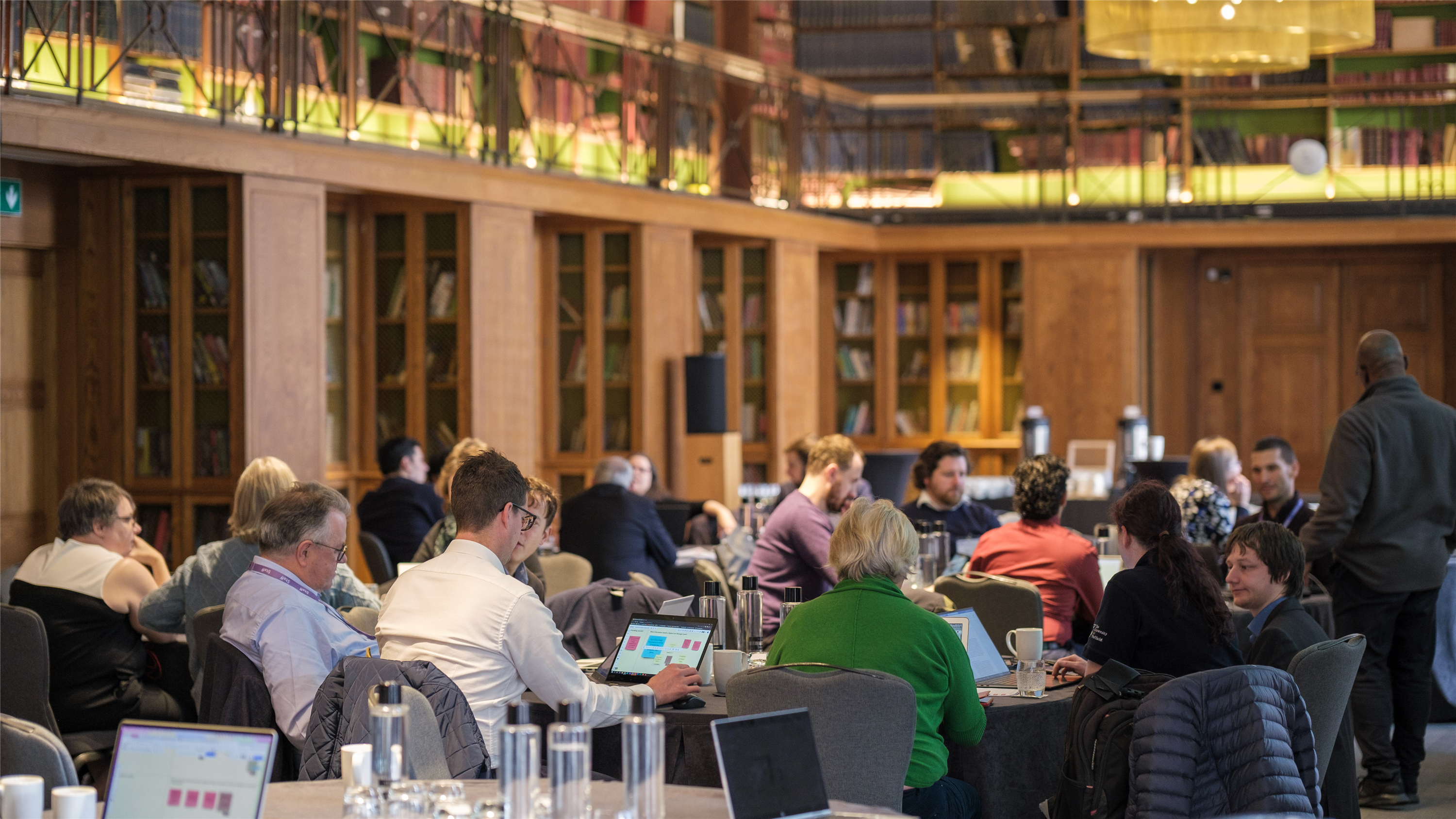
- A great deal of work is going on in the areas of skills and competence, and we touched on only a small fragment of this.
- We need to educate our young people in a different, more cross-sector way, but we also need to upskill everyone to be better prepared and more able to embrace their new abilities and value them.
- Things will continue to deteriorate if we don’t begin to work on building digital literacy and a digital approach into all our activities.
- The work we do needs to be a combined effort between government and industry, individuals and organisations. Industry needs to articulate to the government what policy and regulation will work, and needs to take responsibility for implementing fundamental change.
- Key to this are the people at the interfaces between our sectors and disciplines. They can bring experience and contrast that we could never be able to grasp on our own, and will be essential in helping us break the siloed approach to digital and begin to create a common language.
Listen to the Apollo Forum Podcast
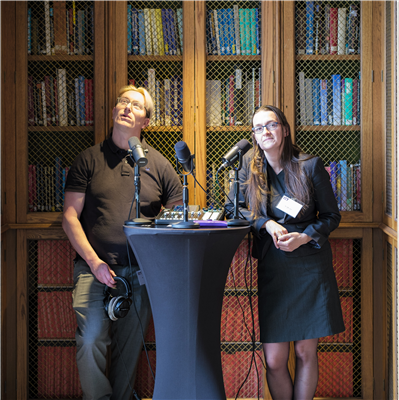 If you’re interested to learn more about what we discussed, why not listen to the podcast episode about this hack? It includes interviews with speakers and conversations with participants.
If you’re interested to learn more about what we discussed, why not listen to the podcast episode about this hack? It includes interviews with speakers and conversations with participants.
Listen here:
https://soundcloud.com/apollo-forum/human-capital-hack-podcast
Follow the podcast so you get notifications when we publish new episodes.
Next Steps for the Apollo Protocol
Over the coming weeks, the Apollo Protocol team are working on drawing together a three-part report capturing the work of the last four months. This will consist of:
- A look at the Apollo Protocol initiative and how it fits into wider Cyber Physical Infrastructure policy.
- An analysis of the methodology used for the Forum Hacks, how they relate to our operating principles and how to use them for other Forums.
- An independent analysis of the outputs and outcomes of the Hacks, the use cases and what we have learned overall.
Meanwhile, work is underway to take the initiative forward, and we’ll be sharing more about this in the coming weeks.
If you’d like to be kept informed please join the Apollo Protocol Network on the Digital Twin Hub. Joining the Hub is free and if you ‘follow’ the Apollo Protocol Network you’ll receive updates via email.
About the Apollo Protocol
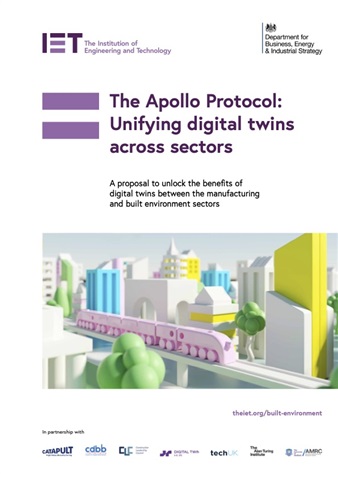 The Apollo Protocol is an initiative to unlock the benefits of digital twins between the built environment and manufacturing sectors, supported by the technology sector.
The Apollo Protocol is an initiative to unlock the benefits of digital twins between the built environment and manufacturing sectors, supported by the technology sector.
Read more in our white paper The Apollo Protocol: unifying digital twins across sectors
The initiative is supported by:
- The Department for Business, Energy and Industrial Strategy (BEIS)
- Innovate UK
- The Institute of Engineering and Technology (IET),
- The Construction Leadership Council (CLC),
- The University of Sheffield Advanced Manufacturing Research Centre (AMRC),
- The High Value Manufacturing (HVM) Catapult,
- The Construction Innovation Hub,
- The Digital Twin Hub,
- techUK and
- the Alan Turing Institute.
[1] For example, the Architects Registration Board’s new regulatory framework (published on 8th February 2023) offers a wider range of flexible routes to qualification as an architect https://arb.org.uk/arb-launches-tomorrows-architects/